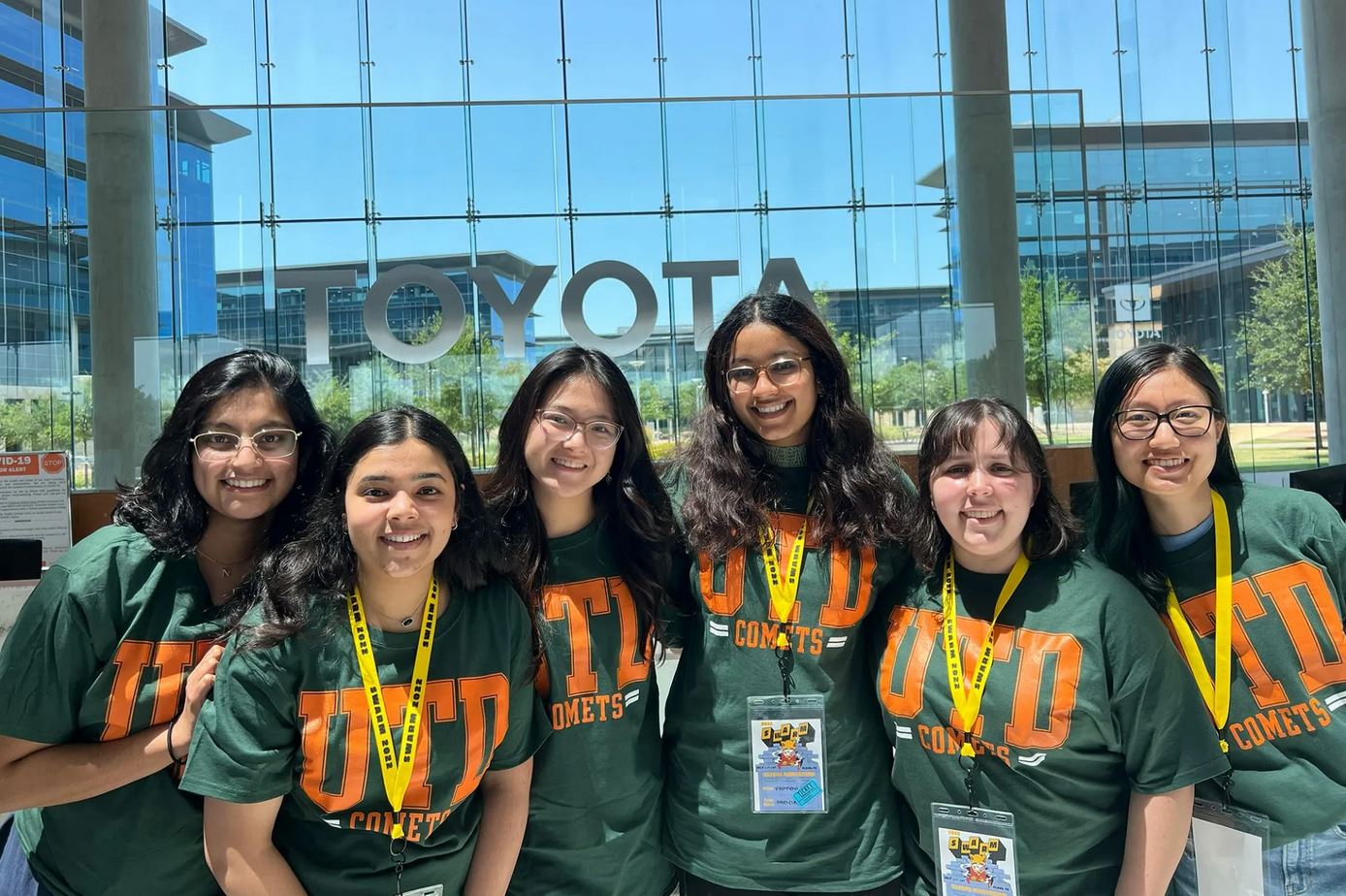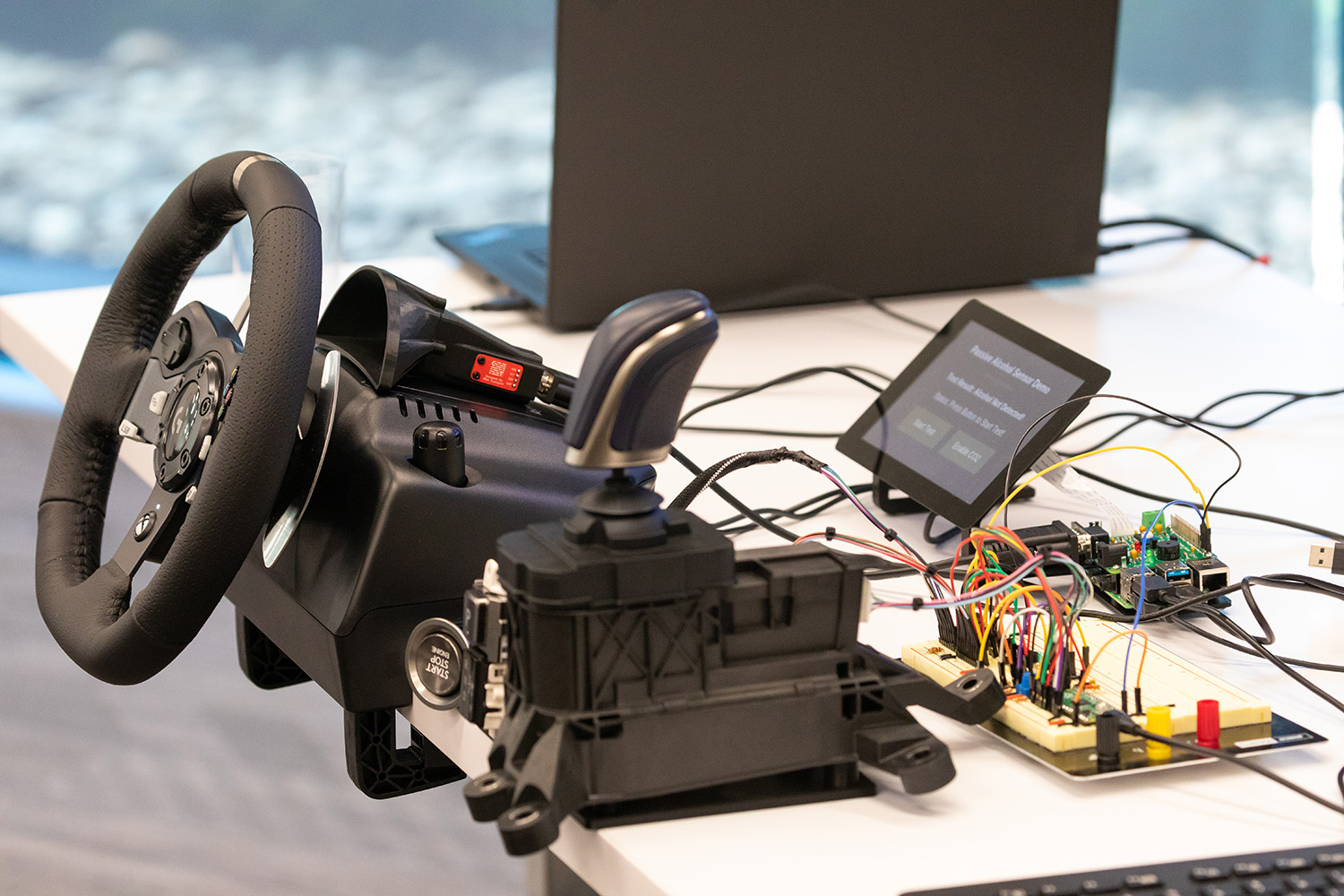Students Accelerate Engineering, Tech Skills at Toyota Hackathon

Seven University of Texas at Dallas students earned spots to compete alongside Toyota software and hardware engineers from all over the world at the SWARM Connected Mobility Hackathon, held this summer at the company’s U.S. headquarters in Plano.
Toyota invited six students to participate in the 36-hour companywide “concept-to-creation” challenge after meeting them last spring when they won WEHack, a Society of Women Engineers hackathon held on the UT Dallas campus and sponsored in part by Toyota. Matthew Chang, a computer science graduate student and an intern with Toyota Connected, also participated in the SWARM event.

Five UT Dallas students were the only attendees not directly affiliated with Toyota asked to join the hackathon, which challenged participants to develop new technologies to prevent drunken driving, reduce carbon dioxide emissions and more. For moments when engineers needed a break, the July event also featured giant board games, drones, karaoke and all-night programming sessions.
The students worked on different teams alongside more than 400 engineers from Toyota companies and affiliates, including co-sponsors Toyota Motor North America and Toyota Connected, as well as organizations from three other continents.
“We’re utterly grateful for our collaboration with UT Dallas to invite WEHack winners to join in our hackathon, as it will help these talented young women to continue challenging themselves and grow into well-rounded engineers,” said Brian Kursar, chief technology officer and group vice president for digital technology at Toyota and one of the event’s founders.
Palak Bhargava, a computer science senior and Toyota intern, said the hackathon was a lot of fun and a great experience. She and her team placed third in a challenge to develop a product to prevent drunken driving.
“The length of the hackathon and the high-stakes evaluations were not something I was used to. The thing that made me most nervous was that I was an intern competing against experienced, full-time employees,” Bhargava said. “However, everyone at Toyota was incredible. We received mentorship throughout the process, and their feedback and words of encouragement were just the confidence boost my team needed.”
Keyan Huang, an arts, technology, and emerging communication student who will attend UT Austin this fall, said her UT Dallas design courses were useful with her project to help manufacturing plants accurately predict their energy needs to optimize energy consumption. She helped with graphics and data visualization and created the dashboard for the potential product.
“I was nervous at the beginning,” Huang said. “After I started working with people, everyone was so helpful, friendly and generous to share their thoughts and ideas. I am inspired by everyone’s passion for their profession and jobs.”
“Our relationship with UT Dallas is just the beginning of what we are looking to grow into a widespread collaborative research opportunity between our organizations.”
Trey Spyropoulos, manager of communications and organizational effectiveness at Toyota
Trey Spyropoulos, manager of communications and organizational effectiveness at Toyota, said the company invited the students to participate in the hackathon as part of ongoing efforts to strengthen its partnership with UTD.
“Our goal at Toyota is to help develop the next wave of talent entering the job market. Our relationship with UT Dallas is just the beginning of what we are looking to grow into a widespread collaborative research opportunity between our organizations,” Spyropoulos said.
Allison Pham, an electrical engineering junior, worked on a project to develop an alcohol sensor and driving pattern recognition software. She said the project involved hardware she had learned to use in engineering classes.
“My team helped me learn how to solder for the first time, and I got to do real testing of our physical prototype. This experience has helped immensely with my professional career and provided great networking opportunities,” she said.
Other WEHack students invited to participate in the Toyota event were Gail Hernandez, computer science junior; Vyshnavi Nalla, computer science junior; and Nithila Shenoy, electrical engineering senior. In addition, Chang was on a team that finished second overall in the drunken-driving prevention category.
Source | UT Dallas News Center
ABOUT THE UT DALLAS COMPUTER SCIENCE DEPARTMENT
The UT Dallas Computer Science program is one of the largest Computer Science departments in the United States with over 4,000 bachelors-degree students, more than 1,010 master’s students, 140 Ph.D. students, 52 tenure-track faculty members, and 42 full-time senior lecturers, as of Fall 2021. With the University of Texas at Dallas’ unique history of starting as a graduate institution first, the CS Department is built on a legacy of valuing innovative research and providing advanced training for software engineers and computer scientists.




